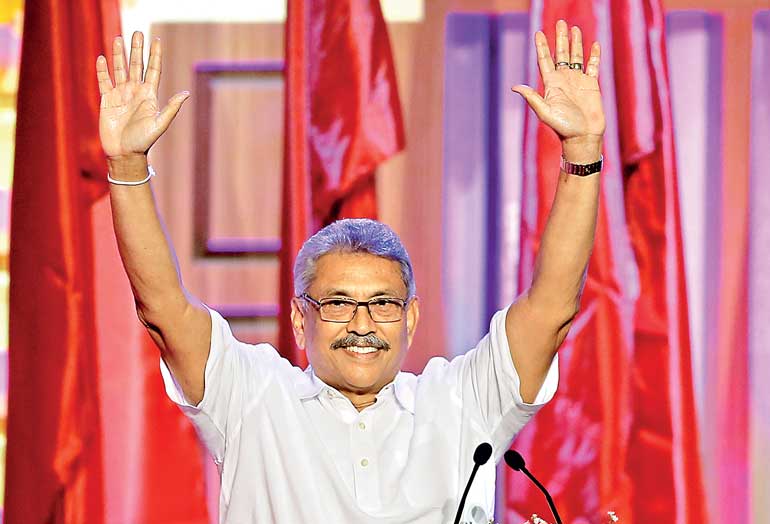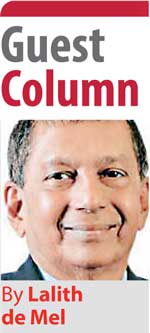Monday Feb 16, 2026
Monday Feb 16, 2026
Tuesday, 1 February 2022 01:55 - - {{hitsCtrl.values.hits}}

The President that came into active politics only recently and is pushing contentious issues, therefore in colloquial English, can be called a “Johnny-come-lately” politician
If one said that 70% in Sri Lanka are Sinhala Buddhists that would be an accurate statement. But we have people in high places saying that we are a “Sinhala Buddhist country”. That has a ring to it that connotes that the country belongs to the Sinhala Buddhists and that the rest will not have the same status, and rights as the Sinhala Buddhists. The end of the days with a level playing field. Those who sing the Sinhala Buddhist country theme, must clarify what migration from a country with 70% Buddhists to a Sinhala Buddhist country means and how it will affect all the people of this country. If there is no difference, why put this potentially damaging expression into circulation: Non-Sinhala Buddhists.
They are a melting pot of people of different races with different customs and religions. All contributing to creating Sri Lanka culture. A fascinating subject to ponder is whether the non-Sinhala Buddhists can be swept away as relatively unimportant.
The non-Sinhala Buddhists are found in all parts of what constitutes our society. In the past we had politically experienced leaders. All of them had the common sense to appreciate, that the non-Sinhala Buddhists are an important part of our country, and must be treated equally in every respect with the Sinhala Buddhists, that and we must all hold hands warmly and strive to create one united society where we all live together harmoniously. However, when people now in high places say this is a Sinhala Buddhist country, they strike a discordant note.
There is a lovely expression used in English. It is “Johnny-come-lately”. It is not blatantly offensive, but skirts the boundary of being derogatory, but the touch of mischief about it makes it a statement that can be used without giving offence. It means someone who has come recently into an area or position in some organisation and is seen as someone with a high opinion of themselves pushing their own agenda. So, you put them in their place saying you are a Johnny-come-lately.
The President that came into active politics only recently and is pushing contentious issues, therefore in colloquial English, can be called a “Johnny-come-lately” politician.
The non-Sinhala Buddhists are not “Johnny-come-latelys”. The Tamils have been here as long as the Sinhala population. There have been Tamil kingdoms in the north existing simultaneously with Sinhala kingdoms in the south. Christians came into being with the arrival of the Portuguese around 1500. Arab traders who were Muslim were here from before the arrival of the Portuguese and were settled on the east coast. The Indian workers on the plantations were brought here by the British and they also brought the Malays to this country. The term Burgher was applied to fair skinned people who were descendants of Portuguese, Dutch and British who were married to Sinhala people. Sadly, these lovely people have all but disappeared having migrated.
In all parts of our economy there is a mix of Sinhala Buddhists and non-Sinhala Buddhists. We have this mix in every part of our society. Doctors, lawyers, accountants, other management professionals, farmers who produce the rice and vegetables, fishermen, the artisans who build our houses, the vast retail network that provides food and other things our society needs.
Within these two segments of Buddhists and non-Buddhists we have many sub-sects. The Sinhala Buddhists are divided by castes. Some castes are perceived as lower than other castes. There is a similar profile amongst the Tamils. The Muslims are similarly divided by religion. The Christians also have their different sects. If you give each a colour and mark it on a map, all colours will be seen in all parts of the country but with a greater concentration of some colours in some areas.
The challenge
The challenge is to get all these diverse groups to live together happily, in a society where no segment of our society perceives any discrimination. It is perceptions that matter. The Government must give the lead to create the atmosphere of a society where there is no discrimination. We have since independence had as leaders Prime Ministers and then as Presidents, people who were all Buddhists.
One feature common amongst all of them was that they were not “Johnny-come-latelys”. They were political leaders with considerable experience who could read the instincts of the people. They had the nous to smell trouble whilst it was on its way and the skill and capacity to prevent it blossoming into widespread dissent. They were all committed to the one country no discrimination thesis.
The price to pay
If dissent relates to some economic issue, it can be diffused by addressing the cause. If the problem is that all the “non-Johnny-come-lately” segments of our society composed of different races and religions feel discriminated against; they will react in the strongest possible option available to them. Some will emigrate causing a severe brain drain. The northern Tamils will demand freedom to manage their affairs in a federal structure or they could go further and demand a separate state and push their argument with both words and with guns. If we look at what is happening around the world such arguments are now pursued with rockets and missiles.
Our country in economic terms is heavily dependent on the old traditional non “Johnny-come-lately” racial and religious segments. A large part of our desperately needed foreign exchange is generated by the non-Buddhists. Some of the biggest exporters and manufacturers in apparel, tea as well as diversified blue chips and many services companies are non-Buddhist. Probably the greater part of our economy is either owned or dependent on non-Sinhala Buddhists.
Conclusion
We had a Buddhist political leadership for many years. In their maturity they were totally committed to the one country concept with no discrimination. When this is replaced and governance moves into the hands of “Johnny-come-latelys” there is a shudder. We can only hope that wiser counsels from those in leadership in the past, will lead to the “Johnny-come-latelys” committing without reservation to the one country concept with no discrimination against minorities.